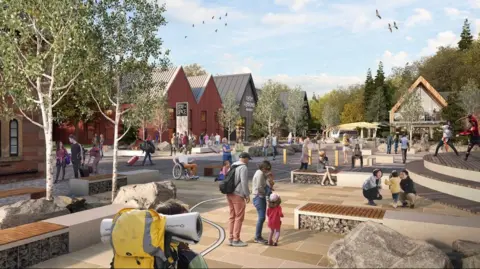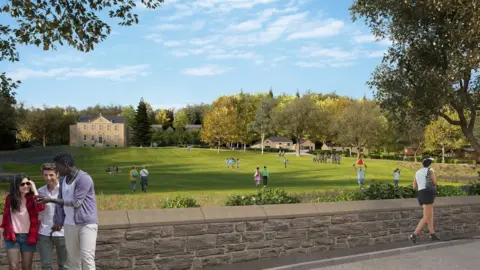 Lomond Banks
Lomond BanksThe Scottish government has stalled plans for a controversial holiday park at Loch Lomond.
Ministers had previously been set to give permission for the development, overturning the national park authority which said it did not comply with environmental and nature conservation policies.
Theme park operator Flamingo Land believed it would be given the go-ahead to build a £40m resort called Lomond Banks, featuring a waterpark, monorail, hotel and restaurants.
The Scottish government’s Minister for Public Finance, Ivan McKee, has now said he will recall the plans because “the development raises issues of national significance in view of its potential impact on Loch Lomond and the Trossachs National Park”.
He said: “This means that the appeal should be determined at a national level.”
McKee has previously resisted calls for ministers to intervene in the decision to allow the plans to go forward.
The original proposal sparked protests and was initially rejected last September by Loch Lomond and the Trossachs National Park authority, who said it did not comply with environmental and nature conservation policies.
But that was appealed to the Scottish government reporter, who last month said they intended to grant permission – subject to a legal agreement between Flamingo Land and the park.
Government reporters consider the vast majority of appeals, appointed by ministers to make a decision on their behalf.
However some of these are “recalled” by ministers who will then make the final decision themselves.
When the Scottish government reporter announced in May the intention to back the plans, development director for Lomond Banks Jim Paterson said it was a “real milestone moment” which had been “a long time in the making”.
But Scottish Greens MSP Ross Greer, who has been a long-standing critic of the plan, said the development would cause “irreversible damage” and the decision was an “anti-democratic outrage”.
Following Ivan McKee’s ‘s latest announcement, Greer said it was “the right move”.
He added: “The evidence of the damage it would do to one of Scotland’s most iconic locations is overwhelming.
“Once ministers consider the flood risk, loss of ancient woodland, hundreds of additional cars which would be brought onto notoriously congested roads and the litany of other devastating impacts it would have, I am sure they will reject the mega-resort application and finally end this decade-long saga.”
 Lomond Banks
Lomond BanksThe decision comes ahead of a vote in the Scottish Parliament on the issue, led by Scottish Labour.
The party’s deputy leader Jackie Baillie welcomed McKee’s decision to recall plan, saying: “It shouldn’t have taken the fear of a defeat in Parliament to force them to reach this decision.
“The SNP has ignored concerns time and time again – from politicians across the chamber and from local campaigners.”
The Balloch and Haldane Community Council previously said it was “deeply disappointed” in the decision to approve park plans. The group said this “contradicts the expressed will of the community”.
A spokesperson added: “This is not just a bad planning decision, it is a fundamental failure of democracy and policy.
“This decision rides roughshod over the principles of community empowerment, environmental protection, and democratic accountability.
Flamingo Land first submitted plans for the site in 2018, but withdrew them the following year after a wave of negative reaction.
It submitted updated plans in 2020, insisting the proposal would be a “major step away” from its other resorts, including a theme park and zoo in Yorkshire.
But the Loch Lomond park authority board ruled that the updated scheme still conflicted with both regional and national environmental policies.
Stuart Pearce, “director of place” for the park authority, previously said the plans created “unacceptable risk” of flooding of the River Leven.
More than 174,000 people signed a petition against the project.
What is the history of Flamingo Land?
The Flamingo Land resort in North Yorkshire has been operating since 1959, initially as a zoo.
The name comes from a colony of the brightly coloured birds that were among the first animals on the site at Kirby Misperton.
By the 1970s, the zoo was losing money, and the attraction was revamped as a “day out” experience with a growing focus on amusement rides.
The Yorkshire site continues to have exotic animals, and there is also a large holiday village with static caravans and lodges.




